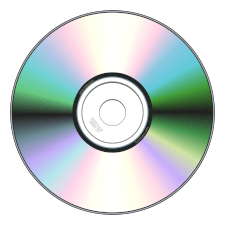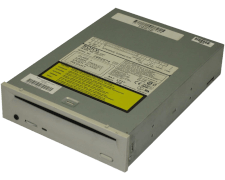CD-ROM
Stands for "Compact Disc Read-Only Memory."
CD-ROM is a read-only optical media format that uses CDs to store data. A computer with an optical drive can read, but not write, data on a CD-ROM. A single disc can store up to 700 MB of data. Some CD-ROM discs, known as "Enhanced CDs," store a combination of audio tracks and a data track. CD-ROM discs were often used to distribute software and video games in the 1990s and 2000s before eventually being replaced by higher-capacity DVDs.
CD-ROM discs and audio CDs are physically identical, storing and retrieving data in the same method. Digital data is encoded and stored as a series of pits on a flat reflective layer on the bottom of the disc. The laser in the optical drive reads these pits, then decodes the data. The only difference between the two is how the data is formatted — multiple PCM audio tracks on an audio CD, or a single track containing data on a file system on a CD-ROM.
An optical drive can spin a CD-ROM disc at a significantly higher speed than an audio CD player. A CD spinning at the standard rate for audio playback supports a data transfer rate of approximately 150 KB/s; at this speed, reading an entire CD-ROM full of data takes almost 80 minutes. CD-ROM drives are classified by how many times faster they can spin, with many drives capable of 40x (6,144 KB/s) or more.
 Test Your Knowledge
Test Your Knowledge
